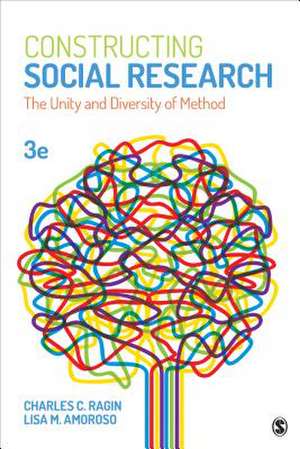Constructing Social Research: The Unity and Diversity of Method
Autor Charles C. Ragin, Lisa M. Amorosoen Limba Engleză Paperback – 25 iun 2018
Updated throughout with new references and examples, this edition is designed to evoke challenging questions regarding the nature of representation and the ethical challenges facing social scientific researchers. The text moves beyond standard research challenges to push readers to see the complex relationships among ethics, ideas, evidence, and outcomes.
Preț: 439.29 lei
Preț vechi: 516.81 lei
-15% Nou
84.06€ • 91.59$ • 70.83£
Carte tipărită la comandă
Livrare economică 23 aprilie-07 mai
Specificații
ISBN-10: 1483379302
Pagini: 232
Dimensiuni: 152 x 229 x 15 mm
Greutate: 0.32 kg
Ediția:Third Edition
Editura: SAGE Publications
Colecția Sage Publications, Inc
Locul publicării:Thousand Oaks, United States
Cuprins
Acknowledgments
PART I: ELEMENTS OF SOCIAL RESEARCH
CHAPTER 1: What Is (and Is Not) Social Research?
Introduction
Some Conventional Views of Social Research
Social Research and Other Ways of Representing Social Life
How Social Research Differs
Conclusion
CHAPTER 2: The Goals of Social Research
Introduction
Seven Main Goals
The Link Between Goals and Strategies
The Social Nature of Social Research
CHAPTER 3: The Process of Social Research: Ideas and Evidence
Introduction
The Interpretive Model of Social Research
Processes and Strategies of Social Research
The Challenge of Social Research
CHAPTER 4: The Ethics of Social Research
Introduction
Ethical Dilemmas and Failures
The Troubled History of Ethical Research
The Current Ethical Standards and Institutional Oversight
Ethical and Professional Dilemmas Facing Social Researchers
The Problem of Representation
Conclusion
PART II: STRATEGIES OF SOCIAL RESEARCH
CHAPTER 5: Using Qualitative Methods to Study Commonalities
Introduction
The Goals of Qualitative Research
The Process of Qualitative Research
Using Qualitative Methods
The Study of a Single Case
Conclusion
CHAPTER 6: Using Comparative Methods to Study Diversity
Introduction
Contrasts With Other Research Strategies
The Goals of Comparative Research
The Process of Comparative Research
Using Comparative Methods
Conclusion
CHAPTER 7: Using Quantitative Methods to Study Covariation
Introduction
The Goals of Quantitative Research
Contrasts With Other Research Strategies
The Process of Quantitative Research
Using Quantitative Methods
Conclusion
Afterword: The Promise of Social Research With Mary Driscoll
Appendix: Computing Correlation Coefficients
References
Glossary/Index
About the Authors
Notă biografică
Charles C. Ragin spent most of his youth in Texas and the southeastern United States. He attended the University of Texas at Austin as an undergraduate and received his BA degree in 1972 at the age of 19. That same year he began graduate work in sociology at the University of North Carolina at Chapel Hill and received his PhD in 1975. From 1975 until 2001, he lived in the Midwest, teaching first at Indiana University and then at Northwestern University. He headed west in 2001, where he spent just over a decade at University of Arizona-Tucson. In 2012, he joined the faculty at the University of California-Irvine, where he is currently the Chancellor¿s Professor of Sociology. He is best known for developing a methodological alternative to conventional research methods, using formal set-theoretic techniques for comparative research. His many publications address broad issues in politics and society, with topics ranging from the causes of ethnic political mobilization to the shaping of the welfare state in advanced capitalist countries. He has written several books including Intersectional Inequality: Race, Class, Test Scores and Poverty (with Peer Fiss, 2017). Redesigning Social Inquiry: Fuzzy Sets and Beyond (2008) Fuzzy-Set Social Science (2000). His book The Comparative Method: Moving Beyond Qualitative and Quantitative Strategies (1987) won the 1989 Stein Rokkan Prize of the International Social Science Council of UNESCO. In 2014 he received the Paul F. Lazarsfeld Award of the American Sociological Association. He is married to Mary Driscoll, and they have two sons, Andrew and Daniel.
